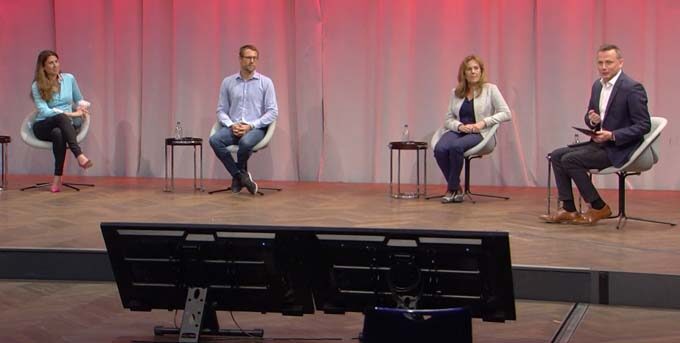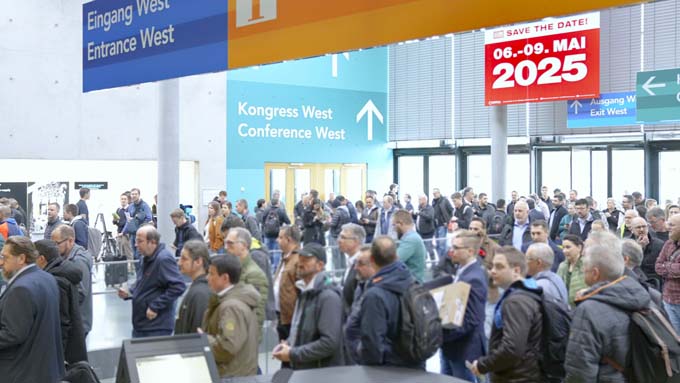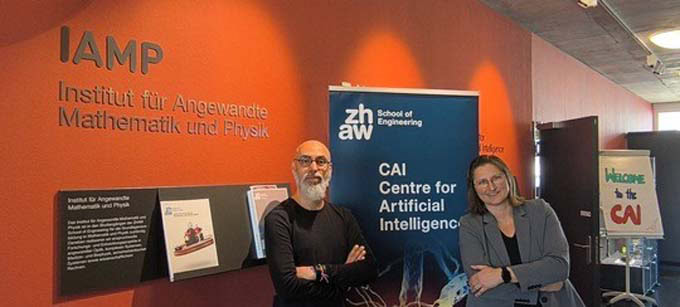Swiss Quality Day 2020 on digital paths
There has never been a Swiss Quality Day (abbreviated TSQ) like the one on 13 May 2020. Because no major events were permitted due to the corona pandemic measures, there was a premiere: the SAQ went live via stream for the first time with the popular conference. MQ was present and showed first highlights of the TSQ2020.

This was the first time that SAQ Managing Director Marlyse Roulin had the pleasure of welcoming guests to the Swiss Quality Day. And immediately for this debut she found herself in a new situation: the TSQ2020, a traditional event that is usually planned for several hundred quality managers in the Kur- und Kongresssaal Bern, not only addressed new dimensions of artificial intelligence (AI) in terms of content, no, it turned into a digital, supra-regional live event, so to speak. Marlyse Roulin, spoke to few SAQ experts on site, but all in all the TSQ2020 was a great premiere for the SAQ CEO, as well as for the keynote speakers.
"AI: Opportunity or Risk?
The chosen topic was also fitting: "Artificial Intelligence (AI): Opportunity or Risk?" - A question that Marlyse Roulin also asked herself in her opening speech, but not without neglecting the point of the actual opportunity in this topic. However, this is only possible if companies create more agile structures and move away from silo thinking. And it is important to keep up to date with the progress of AI. With this year's Swiss Quality Day, the SAQ made a contribution to this. Not only did Federal Councillor Guy Parmelin address the SAQ with a detailed greeting on AI, but also with interesting highlights on IT and QM practice.
In the first presentation of the morning, Dalith Steiger from SwissCognitive subjected the conference topic to a "reality check". AI is essentially an extension of the increasing networking of objects. It is no longer just about the pure exchange of data, but about "making something out of the data". Making more and more products "smart" is a great opportunity for companies of all sizes. AI makes it possible to let algorithms do what humans don't like to do. Saving time and eliminating dangers. This opens the gates for the actual human core competence: creativity.
Some of these aspects were addressed again in the subsequent panel discussion. Ewa Ming, Gregory Lukowski, Dalith Steiger spoke with discussion leader Andy Fitze about the question of what could make AI better - also in terms of quality. Finally, it was about the well-tried credo "garbage in, garbage out", which says that a computer is very likely (but not necessarily) to produce an invalid or non-meaningful output if the input is not meaningful.
Therefore, the participants in the discussion agreed, it is primarily a matter of differentiating good data from bad data. Dalith Steiger also pointed out that one should not think that AI technology will suddenly make the world work by itself. Creative and ethical approaches are still needed to control and use digital processes.
And what should companies plan as their first steps when they think about AI? Involve employees, know your own business, understand basic data, and understand what customers want. In addition, you should look for the right partners - preferably also people from other industries who initiate "thinking out of the box".

Why standardization for AI?
Filiz Elmas has been Head of Business Unit Development for Artificial Intelligence (AI) at DIN since 1 June 2019. Her task, in cooperation with the responsible project managers, is to capture the synergies of all current AI projects and also to design future projects in such a way that the benefits of standardization for business, research and society in the field of AI are at the forefront.
The fact that artificial intelligence needs norms and standards has become clear not least through the AI strategy of governments, but also through the live-stream digitization of society in recent times. Elmas: It is the task of standardization to help structure the AI landscape and, together with DIN staff and the experts, to create a clear framework for action alongside other official regulations.
Digitalization in practice - for the benefit of quality
In the afternoon, the focus was on digitalization - not only in the form of AI - in practice. First, Ruedi Bigler provided an insight into his modern farming business. "My most important tool today is a smartphone," said the master farmer, who is also President of Aaremilch and Vice President of the milk sector organisation. He showed how, thanks to a high level of automation, cows can go out to pasture autonomously and be milked, or how GPS support can be used to sow, fertilise and mow with centimetre precision. However: Digitalisation probably increases efficiency in agriculture too, "but I still have to be able to look the animals in the eye to see if they are doing well", Bigler said.
Pascale Lenz from IBM showed how HR tasks are managed in a large corporation with the help of various tools. Here, too: It's all about data, data and more data. But thanks to this, employees can be developed in a targeted manner and prepared for further career steps. With the help of e-learning tools, IBM also provides the necessary training so that employees can achieve the goals they have set for themselves.
Dominik Weibel from eMDe Blechfabrik explained the production processes in his company: Based on Microsoft SharePoint and in combination with QR codes, large parts of the paper management are digitalized, which makes process management transparent and independent of different platforms. The customers themselves also play an important role: They are the ones who enter the orders directly into the ERP - via an online calculation platform that is unparalleled in the industry.
Stefan Keller from Bühler Uzwil then demonstrated that digitalization and AI applications are making products such as food safer. One of their solutions is capable of detecting 250,000 grains of rice per second and sorting out those that do not meet the quality criteria using a targeted air flow. Or the plans for a "Smart Mill": behind this is the idea of a completely autonomously operating mill. A pilot plant has been in operation for two years.
Human core competence "creativity
At the end, Gerriet Danz invited the audience to an "Expedition Innovation". He showed that change is a decisive driver of creativity. Using various examples, he demonstrated that something new and successful often emerges when things can be linked in a new way. He said that one can learn a lot from children: "They just start, while adults first discuss how a team should be put together". With creativity, boundaries can be crossed.
This inspiring lecture concluded the exceptional Swiss Quality Day 2020. In his closing remarks, SAQ President Ruedi Lustenberger pointed out that developments cannot be stopped. "Development happens". But: "You cannot forbid intelligent people to think. Because without human intelligence, there would be no artificial intelligence either".

The next Swiss Quality Day will take place on 4 May 2021 - hopefully in a familiar atmosphere again. Despite the excellent organization of the live stream and the impeccable quality of image and sound, one thing was missing: the opportunity for networking.









